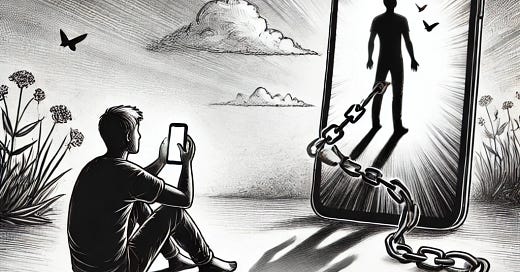Dopamine Chronicles (2/4): The Modern World
"It's like giving coke addicts infinite supply and say, Enjoy"
Dopamine drives us to chase rewards.
Great? It is—until it isn’t. As dopamine sources become more potent and abundant, our dopamine systems get overloaded.
This is a massive problem in the modern world.
This is the 2nd of a 4 part series. Last week I wrote about the experiment of dumbing my phone and blocking websites I compulsively go into. This made me realize 1. how addicted I truly am, and 2. How much more I enjoy life when I am not ending up consuming cheap dopamine
Dopamine Chronicles (1/4): The Experiment
…The effects from the experiment are just crazy. I’ve experimented with alot of things, but now I feel free. I am not a slave anymore. And I didn’t really understand how much of a slave I was.
The Dopamine Cycle
Imagine hiking for hours. You’re exhausted. Then, over a hill, you see the peak—your destination. You feel a rush of joy.
That’s dopamine. It’s surging
Dopamine spikes with anticipation of something rewarding. Dopamine is the excitement of a future collect, and the molecule pushes us to seek it. The peak happens at reward.
After peak, dopamine levels drop to make us go seek again.
Very common is a drop below the dopamine baseline, which is a state we hate. It makes us irritable, feeling discontent, and annoyed with the situation. This crash is harder, the more intense and quick the spike is.
Natural dopamine highs, like hiking, exciting conversations or learning a skill, are different:
They require effort.
They have delayed or gradual rewards.
They provide long-term benefits.
Modern dopamine, however, breaks these dynamics.
The Modern Dopamine Problem
Our brains evolved for a hunter-gatherer world—where effort was required for every reward. The system is built to make us chase things. But today, we don’t need to chase. We get dopamine on demand.
Two major problems arise:
Potency: Natural rewards are replaced by engineered, ultra-potent ones (junk food, social media, video games, etc.).
Abundance: Once scarce, rewards are now instantly available, removing struggle from the equation.
It's like giving coke addicts infinite supply and say, Enjoy.
The bigger the spike, the harder the crash. When we get a massive dopamine hit, we inevitably enter a dopamine deficit state—feeling restless, unmotivated, and unsatisfied. Instead of resetting, we seek another hit, perpetuating the cycle.
This creates small peaks that never restore balance, trapping us in low motivation and chronic dissatisfaction.
The Real-World Consequences
On the surface, life seems perfect. We have comfort, technology, and abundance. Yet, something is deeply wrong:
Suicide rates in the U.S. increased by 36% (2000-2021).
Depression has risen by 50% since 1990.
Young people report more loneliness than ever, despite hyper-connectivity.
Let it be said - blaming smartphones and such is an oversimplification…
…But the correlation is hard to ignore. The rise of smartphones, instant entertainment, and hyper-stimulating content aligns disturbingly well with these trends.
ADHD diagnoses are also soaring. Are more people actually being born with ADHD? Unlikely. A simpler explanation:
Some people naturally have ADHD.
Others develop ADHD-like traits due to constant dopamine overstimulation.
Beyond ADHD and suicide, there’s a subtler, widespread issue: wasted potential.
Many don’t realize they’re operating at a fraction of their capability. After switching to a simpler phone and blocking compulsive websites, I noticed massive shifts in my focus, mood, and motivation. Most people never experience this clarity because they’ve never stepped outside the dopamine loop.
Anna Lembke (Researcher at Stanford) said something smart on a podcast: The seekers were the ones with traits that needed excitement and innovated the world. Now many of them will be trapped in cheap dopamine loops.
The train of wasted life and potential is pacing up.
What Happens If We Keep Going?
Things will get worse before they get better.
Phones will get faster
Screens will get brighter
Games will get more addictive
Social media will get more manipulative
A World Where Everyone Gets Hooked
As dopamine sources become more potent, even those with low addiction tendencies will struggle. Dopamine loops once reserved for gambling and drugs now shape daily life. The consequences:
Shrinking attention spans—deep work and critical thinking decline
Weaker emotional regulation—more anxiety, irritability, and numbness
Loss of delayed gratification—resilience and patience diminish
Shallow relationships—real-world interactions feel less rewarding than screens
A culture of short-term pleasure over long-term fulfillment
The ability to focus, build, and struggle for something meaningful is eroding. If we don’t take control, distraction and superficial engagement will define human existence.
Final thoughts and steps ahead
When I started to write this, it wasn’t intended to be this doomsday-ee.
However, I’m fine with it. I consider this to be a serious threat to our species on so many levels. I see the problem in myself very clearly and I am certain that so many are robbed from positive and true life experiences because of addictions to phone, porn, gaming etc.
See ya next week
/fairhawk





